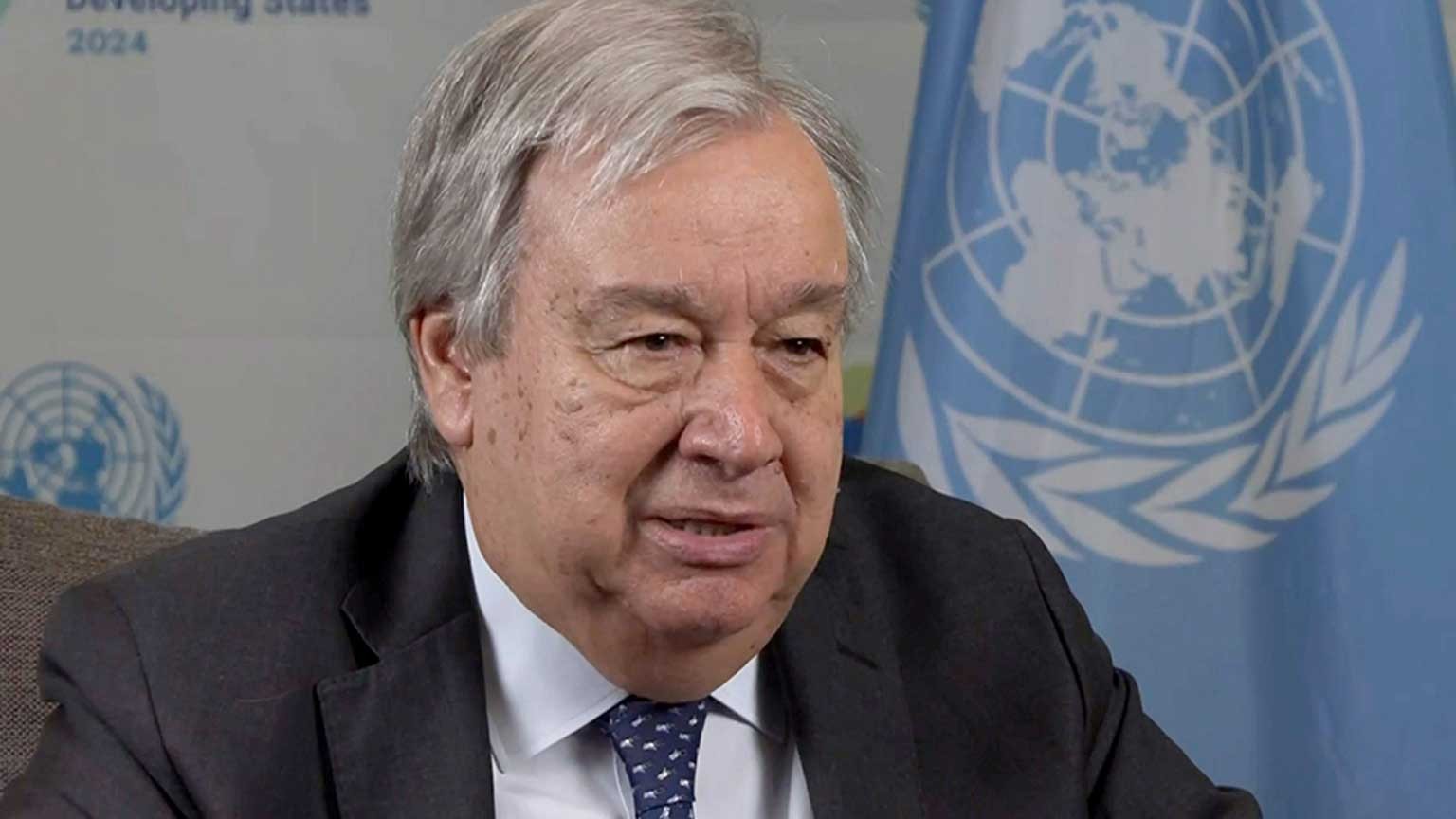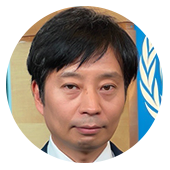Yano Shohei: First of all, we would like to ask about climate change and the conference. Why do you think the world needs to listen to the voices from SIDS (small island developing states) now?
UN Secretary-General Antonio Guterres: First of all, SIDS do not contribute practically to climate change. But SIDS are in the first line of the terrible impacts of climate change. Some small island states are even at the risk of disappearing. Look at Tuvalu, Kiribati, Solomon Islands, they are very low states, it's absolutely essential to stop climate change, and to avoid these countries to become impossible to survive.
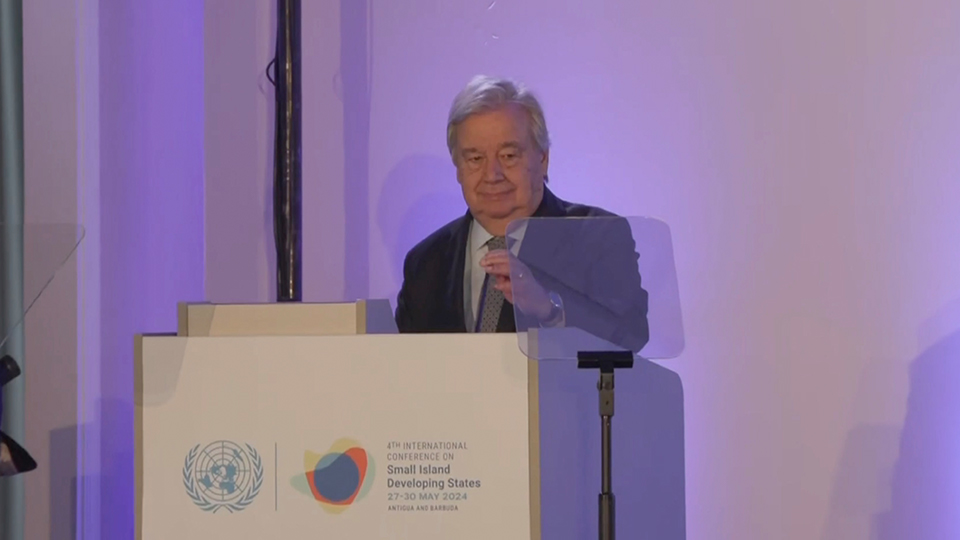
But we see here in the Caribbean, terrible hurricanes. We see in the Pacific, huge storms. We see the sea level rise that in some cases is an existential threat, and in others it forces huge investments of relocation of populations from the coast to higher positions. So the SIDS that already have enormous disadvantages, because they are small, they're isolated, costs are much higher than in other parts. They are small markets. So they have difficulties to attract investment. So the SIDS already have the series of negative handicaps. On top of that they are suffering more than anyone else, the impacts of climate change, and they haven't contributed to it. So I think there is a responsibility of the international community to support SIDS.
And there are two ways to support SIDS. One is to fight climate change, accelerate climate action. Emissions are still growing, this is unacceptable, we are destroying the planet. And we must reverse these trends.
And second, is to provide to the SIDS the kind of financial support that is necessary. In order to address the huge challenges they face with the COVID. Their main income tourism has disappeared during almost two years. With the war in Ukraine and the acceleration of prices, and interest rates, they are highly indebted. So they suffered enormously and with climate, the impacts, the devastating impacts they have. All this has forced them to borrow. All this has forced them to reduce their investments in education, in health, in other aspects of wellbeing. So the international community must understand that we need to support them and we need to help them overcome these dramatic challenges and invest in the protection of their citizens and their communities.
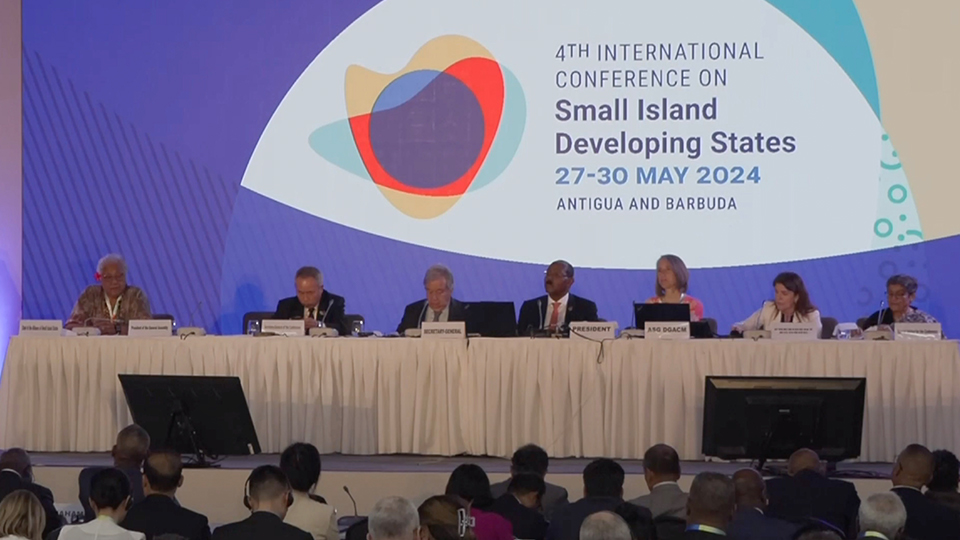
Yano: We know the SIDS conference is held every ten years. What do you think is the most important thing for the next decade?
Guterres: The most important thing for the next decade is to reduce emissions drastically. We need to reduce emissions by 45%, in 2030, in relation to 2010 levels. That is the most important thing for the SIDS is to make sure that we reduce emissions that we stop this acceleration of climate change, of rising sea levels, of the increase of temperature in the seawater, in the sea. Then I think it's important to do the reforms in the international financial architecture and in the mechanisms of financing to smaller government states to help them in these situations. I'll give you an example. They are most of them, because of tourism, middle income countries, but they are very fragile. But since they are middle income countries, they have no access to concessional funding go to that relief. This must change.
That is why there is in preparation of a multi-dimensional vulnerability index that should help international financial institutions create the conditions to allow for SIDS to have access to forms of concessional funding, to forms of debt relief, that are perfectly justifiable, for the high level of vulnerability they have and the dramatic impacts they suffer, namely from climate change.
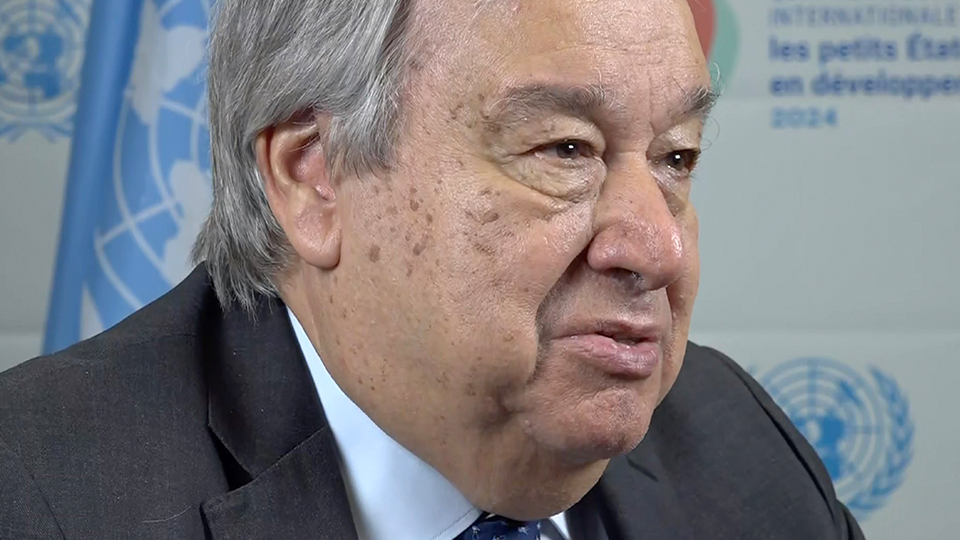
Yano: Could you tell us what do you want to say to developed countries?
Guterres: I say to developed countries, that they have a very important responsibility. They control the international financial system. So they need to reform the international financial system to meet the reform of the international financial system to adapt it to the realities of today's economy, and to make sure that the international financial system is able to provide countries like the SIDS with the resources that they need. And there are many ways to do it. Let's not forget that when we increase $1, the capital of the world bank or of the Asian Development Bank, that means $5 in support to developing countries because there is this multiplying effect. So in times in which budgets are sometimes constrained, it's time to use all the mechanisms of reform that allows for the multiplication of the resources that exist, in order to intensify the support to the SIDS. Then to use the special drawing rights in Japan has been very generous in relation to it, but allow it to go through the multilateral development banks to have this multiplying effect. There is a number of things that can be improved in the way the financial system works. And that can change the capacity to support this.
Let's be frank, we are talking about very small states. To solve the problems of all the 40 small island development states, which costs, will cost, much less then to solve the problems of some of the most troubled economies in big countries. So there is a reason to invest in such a large number of countries that have such an important role in preservation of the oceans. Look at the Pacific, the small islands in the Pacific are relevant, they are, to preserve the oceans. These countries need, really, support and they are sufficiently small for that support not to be so difficult.
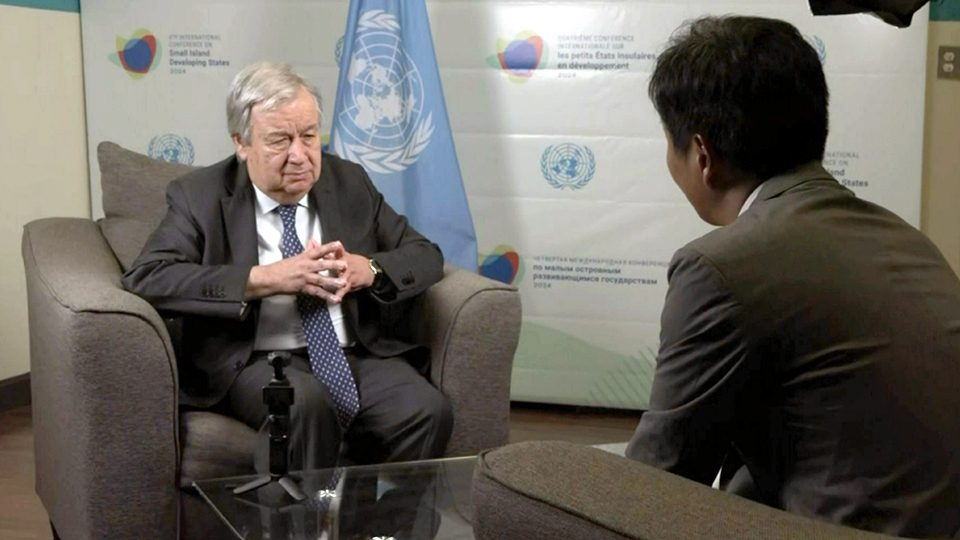
Yano: I have to ask you about the situation in Gaza. I'll ask you a simple question. How do you feel, and how do you describe the current situation in Rafah?
Guterres: Well, after the horrific attacks by Hamas, terror attacks by Hamas, that caused more than 1000 victims in Israel and took hostages. There was, as you know, reaction, military operation in Gaza.
The problem is that that military operation has been conducted in such a way that the number of civilian casualties and the destruction of civilian infrastructure and housing are unprecedented, at least in the time I was Secretary-General.
If you look at Russia, Ukraine, the invasion of Ukraine by Russia, the number of civilians killed in this war that lasts for more than two years, and to very powerful armies with the most sophisticated equipment, and with every bombardment in civilian infrastructure, they have caused less than half the civilian casualties than in Gaza for a few months. And with levels of destruction that are absolutely unacceptable.
That is why we have been since the first moment asked for a humanitarian ceasefire, asked for the immediate and unconditional release of the hostages. It's a terrible situation of the hostages and their families and asked for unimpeded humanitarian access to a population that is suffering enormously.
Recently, the International Court of Justice has been very clear on similar asks, and it's essential that the decisions of the International Court of Justice are respected and are respected by both parties. But it is particularly important to stop with the horrors that we have seen the last just one day ago when people were killed. And apparently now, the Israelis are confessing it was by mistake.
Yano: We know, you used the word "condemn" directly towards Israel's actions in Rafah yesterday. Was it your first time using it against Israel?
Guterres: No. In relation to this operation... yes, because of its dimension. But I have used "condemn" in relation to other countries in different circumstances. In relation to the Russian invasion of Ukraine, in relation to Sudan, in relation to many other situations.
But indeed, from the point of view of the dramatic impact on civilians, this is no comparison, even with other situations in the Middle East.
But we have also condemned the creation of settlements as largely illegal, in relation to international law. And a number of other measures that have been an obstacle to the only thing that can rescue the situation, which is a two state solution in which Israelis and Palestinians can live in peace and security together.
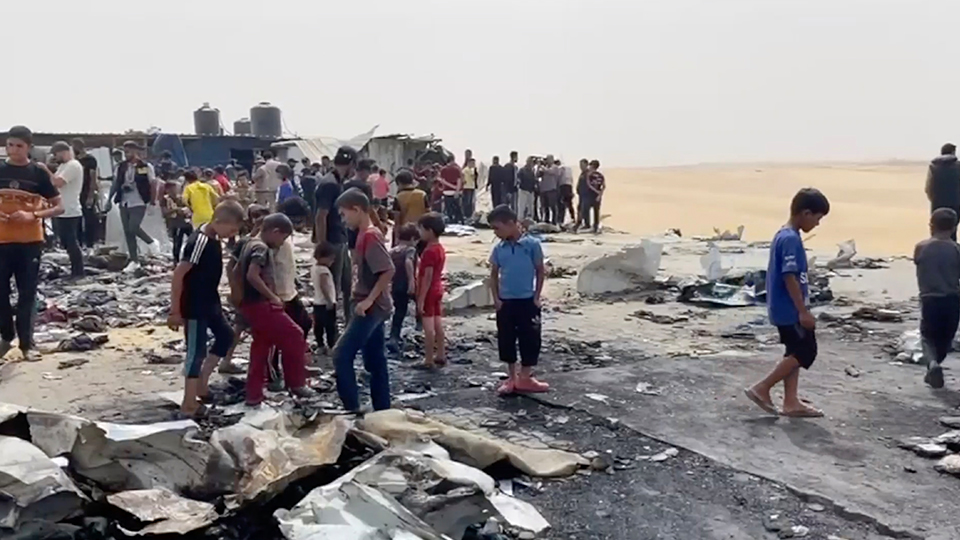
Yano: Israel does not abide by ICJ's order or Security Council resolutions and Israel keeps attacking Gaza causing more civilian death. Do you have any message for the Israeli government right now?
Guterres: The message is simple. Abide by the decisions of the International Court of Justice. We are in a world where we must make sure that international law prevails, international humanitarian law prevails, the rule of law prevails and decisions of courts, universal courts, are respected because they are binding. This is not an opinion. This is a decision that is binding, Israel must abide by the decision.
Yano: What will you do to stop the fighting in Gaza in the future?
Guterres: Well, I hope that there should be a ceasefire immediately. There should be an unconditional release of hostages. Probably this will not happen like that. But we see that there is a resumption of negotiations between Israel and Hamas through Qatar, and with the help of other states, I can only wish that those negotiations come to a success, full outcome. And that will allow for the release of the hostages. And for the end of this horror of destruction of Gaza and the death of the Gaza population.
Yano: For example, when world leaders get together at New York in September, do you have any plans to bring the Gaza issue on the table?
Guterres: I'm sure this will be a central question in the general debate. So do not need to have any initiative on that. This is absolutely clear.
Yano: Could you tell us what do you want to say to around the world?
Guterres: Stop disorder. And do everything to release hostages and the destruction and the killing that we are witnessing, namely of civilians and create the basis for a two state solution to be implemented.
Yano: I would also like to ask you about Ukraine and DPRK. The war in Ukraine has been going on for more than two years and three months. What do you think is needed now for peace?
Guterres: I think peace must be peace based on principles. Peace must be based on the UN Charter. Peace must be based on international law. Peace must be based on respect for the territorial integrity of states and namely of Ukraine.
Yano: Will you attend the Ukraine Peace Summit that will be held in Switzerland next month?
Guterres: The UN is an observer and the UN will be represented there.
Yano: DPRK state media said it launched a spy satellite but failed yesterday. What is your reaction to this action?
Guterres: We have condemned and we condemn all the violations by DPRK, in relation to the launch of missiles, in relation to what was done from the nuclear dimension. DPRK must abide by international law. And by the resolutions of the Security Council. It's absolutely essential. We cannot have a new factor of instability in the world. And, and so it's important, it's essential that DPRK respect international order.
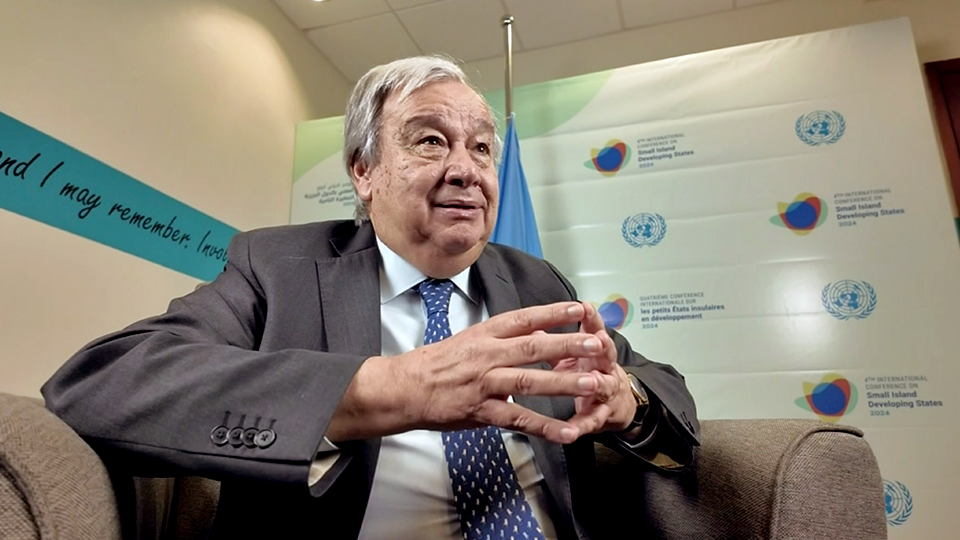
Yano: The UN Panel of Experts on Sanctions against DPRK has been suspended due to a Russian veto. How do you think about this? And do you have any concerns about military cooperation between Russia and DPRK?
Guterres: We sincerely hope that what was established in the sanctions, and it was clear in relation to military cooperation, will be fully respected by Russia.
